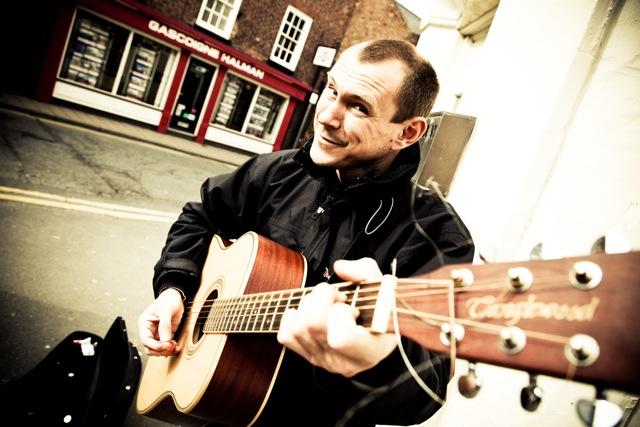Weybourne “Chester” Bingley is a modern-day troubadour. This traveling musician talked to The Busking Project about his album, busker rights and more.
Davi: How did you first start busking? Did you always have troubadour-related aspirations?
Chester:I was studying at the University of Essex in Colchester and had a friend who busked in town. I started off by going out singing with him, and he began to teach me the guitar. Within a few weeks I was going out solo. When I was younger, I never really had any musical aspirations. My only ambition was to do something that allowed me to travel, and after a while I realised busking would do that.
D: You’ve already performed in over 800 towns and cities across Europe. What inspires you to continue busking?
C: The flexibility, being my own boss and not wanting to get a ‘proper job’.
D: What have been your favorite places to busk?
C: It’s been a combination of good money and interesting surroundings. I’m a very outdoorsy person and much prefer mountains and the coast to the big city so somewhere like Chamonix, or a summer evening on a seaside promenade would be my preferred type of location.
“These [busking] regulations are part of a much wider move to privatise and sanitise public space so the entire community is affected.”
D: Sometimes you perform with an amp and sometimes you perform without one. How does this influence your music or a given performance?
C: I play pretty much the same material acoustically or amped- it really is just depends on if I need some extra volume in a noisier location.

D: Do you have any fears over what Brexit might mean for your performing opportunities in Europe?
C: Yes. Online busking magazine “Street I Am” recently featured my thoughts on the subject.
D: You work with Keep Streets Live (KSL). How did you start campaigning for busker rights? What should people know about increased regulations and how they negatively affect buskers and communities?
C: Around the time that KSL appeared in Liverpool, a colleague and I had the idea of going to towns where buskers were getting harassed by so-called officials, standing our ground and filming the results. We called ourselves Buskers Unregulated after the guidance of the 2003 Licensing Act which describes busking as an ‘unregulated activity’. We set up a Facebook page and YouTube channel to share the results and encourage others to do the same. I first met Jonny Walker when the three of us teamed up for a day out in Nottingham to challenge city policy there.
The most important thing to recognize is that most of these ‘regulations’ have no legal standing whatsoever. We should fight to overturn them through non-compliance, and by working with local authorities (where possible) to develop systems that work for all. These ‘regulations’ are part of a much wider move to privatise and sanitise public space so the entire community is affected.

D: What are some common misconceptions about buskers that you hope to combat?
C: I don’t really prioritise this. For example a lot of buskers get really upset about being seen as beggars or people saying they don’t pay tax. I’ll challenge these things if they arise but they don’t really bother me.
D: Final question: if you could collaborate with any artist, alive or dead, who would you work with and why?
C: The golden rule is that in busking, two of you never make twice as much money as you do on your own. So anyone who can buck that rule would be welcome on board!
